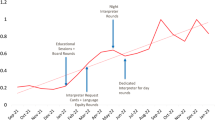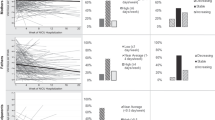Abstract
Objective
To understand the experiences of mothers with a preferred language other than English (PLOE) in communicating with staff and engaging in the care of their hospitalized infant.
Design
We qualitatively analyzed a previously collected and a prospective dataset comprised of transcripts of 36 interviews with Spanish-, Haitian Creole-, and Brazilian Portuguese-speaking mothers of preterm infants from 3 NICUs. We applied the constant comparative method to develop codes and themes, which were inductively structured using the socio-ecological framework.
Results
We identified themes across socio-ecological levels: Individual (unaddressed language barriers, varied maternal empowerment, and justification of suboptimal interpreter use); Interpersonal (family-staff language concordance facilitating engagement, positive impact of non-interpreted informal interactions, and differential treatment based on maternal language status); Institutional (system-level interpretation barriers and varied interpreter service quality).
Conclusion
Mothers with PLOE face multilevel communication and engagement barriers in the NICU; we discuss potential interventions to improve equity in these areas.
This is a preview of subscription content, access via your institution
Access options
Subscribe to this journal
Receive 12 print issues and online access
$259.00 per year
only $21.58 per issue
Buy this article
- Purchase on SpringerLink
- Instant access to the full article PDF.
USD 39.95
Prices may be subject to local taxes which are calculated during checkout

Similar content being viewed by others
Data availability
The datasets generated and analyzed during the current study are not publicly available due to the importance of maintaining participant anonymity, but are available from the corresponding author on reasonable request.
References
March of Dimes. PeriStats. 2023. Preterm Birth Overview. Available from: https://www.marchofdimes.org/peristats/data?top=3.
Sigurdson K, Morton C, Mitchell B, Profit J. Disparities in NICU quality of care: A qualitative study of family and clinician accounts. J Perinatol. 2018;38:600–7.
Horbar JD, Edwards EM, Greenberg LT, Profit J, Draper D, Helkey D, et al. Racial Segregation and Inequality in the Neonatal Intensive Care Unit for Very Low-Birth-Weight and Very Preterm Infants. JAMA Pediatrics. 2019;173. Available from: https://pubmed.ncbi.nlm.nih.gov/30907924/.
Racial/Ethnic Disparity in NICU Quality of Care Delivery. Pediatrics. 2017. Available from http://pediatrics.aappublications.org.ezproxy.bu.edu/content/early/2017/08/24/peds.2017-0918.
Witt RE, Colvin BN, Lenze SN, Forbes ES, Parker MGK, Hwang SS, et al. Lived experiences of stress of Black and Hispanic Mothers during hospitalization of preterm infants in Neonatal Intensive Care Units. J Perinatol. 2022;42:195–201.
Sigurdson K, Profit J, Dhurjati R, Morton C, Scala M, Vernon L, et al. Former NICU Families Describe Gaps in Family-Centered Care. Qualitative Health Res. 2020;25:104973232093289.
Haldar S, Pillai D, Published SA. Overview of Health Coverage and Care for Individuals with Limited English Proficiency (LEP). KFF. 2023. Available from: https://www.kff.org/racial-equity-and-health-policy/issue-brief/overview-of-health-coverage-and-care-for-individuals-with-limited-english-proficiency/.
Obregon E, Martin CR, Frantz Iii ID, Patel P, Smith VC. Neonatal Intensive Care Unit discharge preparedness among families with limited english proficiency. J Perinatol. 2019;39:135–42.
Kalluri NS, Melvin P, Belfort MB, Gupta M PMG. Maternal Language Disparities in NICU Morbidities and Quality Measures. Philadephia, PA: Pediatric Academic Societies; 2020.
Cooper LG, Gooding JS, Gallagher J, Sternesky L, Ledsky R, Berns SD. Impact of a family-centered care initiative on NICU care, staff and families. J Perinatol. 2007;27:S32–7.
Hei M, Gao X, Li Y, Gao X, Li Z, Xia S, et al. Family Integrated Care for Preterm Infants in China: A Cluster Randomized Controlled Trial. J Pediatr. 2021;228:36–43.e2.
Benzies KM, Aziz K, Shah V, Faris P, Isaranuwatchai W, Scotland J, et al. Effectiveness of Alberta Family Integrated Care on infant length of stay in level II neonatal intensive care units: a cluster randomized controlled trial. BMC Pediatr. 2020;20:535.
O’Brien K, Robson K, Bracht M, Cruz M, Lui K, Alvaro R, et al. Effectiveness of Family Integrated Care in neonatal intensive care units on infant and parent outcomes: a multicentre, multinational, cluster-randomised controlled trial. Lancet Child Adolesc Health. 2018;2:245–54.
van Veenendaal NR, van Kempen AAMW, Broekman BFP, de Groof F, van Laerhoven H, van den Heuvel MEN, et al. Association of a Zero-Separation Neonatal Care Model With Stress in Mothers of Preterm Infants. JAMA Netw Open. 2022;5:e224514.
Brignoni-Pérez E, Scala M, Feldman HM, Marchman VA, Travis KE. Disparities in Kangaroo Care for Premature Infants in the Neonatal Intensive Care Unit. Behav Pediatrics. 2022;43:8.
Batton E, Hurst S, Ramos C, Catalan L, Freeman M, Marc-Aurele K. Communication in the neonatal ICU for Spanish speaking parents: a qualitative interview study. BMC Pediatr. 2023;23:481.
Ondusko DS, Khaki S, Huun C, Krantz J, Garcia Godoy L, Johnson A, et al. Do Standardized Scripts Improve Interpreter Use by Spanish-Speaking Patients? J Immigr Minor Health. 2021;23:1021–5.
Yeheskel A, Rawal S. Exploring the ‘Patient Experience’ of Individuals with Limited English Proficiency: A Scoping Review. J Immigr Minority Health. 2019;21:853–78.
Boeije H. A Purposeful Approach to the Constant Comparative Method in the Analysis of Qualitative Interviews. Qual Quant. 2002;36:391–409.
Flores G, Abreu M, Tomany-Korman SC. Limited English proficiency, primary language at home, and disparities in children’s health care: How language barriers are measured matters. Public Health Rep. 2005;120:418–30.
McLeroy KR, Bibeau D, Steckler A, Glanz K. An Ecological Perspective on Health Promotion Programs. Health Educ Q. 1988;15:351–77.
Glanz K, Rimer BK, Viswanath K. Health behavior: theory, research, and practice. New York, NY: John Wiley & Sons; 2015. p. 512.
Velez T, Gati S, Batista CA, Nino de Rivera J, Banker SL. Facilitating Engagement on Family-Centered Rounds for Families With Limited Comfort With English. Hospital Pediatrics. 2022;12:439–47.
Sharma S. Qualitative methods in statistics education research: methodological problems and possible solutions. Educ J. 2013;2:50–7.
Dedoose, cloud application for managing, analyzing, and presenting qualitative and mixed method research data. Los Angeles, CA: SocioCultural Research Consultants, LLC; 2023. Available from: www.dedoose.com.
Palau MA, Meier MR, Brinton JT, Hwang SS, Roosevelt GE, Parker TA. The impact of parental primary language on communication in the neonatal intensive care unit. J Perinatol. 2019;39:307–13.
Miquel-Verges F, Donohue PK, Boss RD. Discharge of infants from NICU to Latino families with limited English proficiency. J Immigr Minor Health. 2011;13:309–14.
Nageswaran S, Ellis MB, Beveridge MS. Communication Challenges Faced by Spanish-Speaking Caregivers of Children with Medical Complexity: a Qualitative Study. J Racial Ethn Health Disparities. 2021;30:1–9.
Parente VM, Reid HW, Robles J, Johnson KS, Svetkey LP, Sanders LL, et al. Racial and Ethnic Differences in Communication Quality During Family-Centered Rounds. Pediatrics. 2022;150:e2021055227.
Khan A, Parente V, Baird JD, Patel SJ, Cray S, Graham DA, et al. Association of Patient and Family Reports of Hospital Safety Climate With Language Proficiency in the US. JAMA Pediatrics. 2022;176:776–86.
Ferrari RM, McClain EK, Tucker C, Charles N, Verbiest S, Lewis V, et al. Postpartum Health Experiences of Women with Newborns in Intensive Care: The Desire to Be by the Infant Bedside as a Driver of Postpartum Health. J Midwifery Womens Health. 2022;67:114–25.
Lee JS, Pérez-Stable EJ, Gregorich SE, Crawford MH, Green A, Livaudais-Toman J, et al. Increased Access to Professional Interpreters in the Hospital Improves Informed Consent for Patients with Limited English Proficiency. J Gen Intern Med. 2017;32:863–70.
Karliner LS, Jacobs EA, Chen AH, Mutha S. Do Professional Interpreters Improve Clinical Care for Patients with Limited English Proficiency? A Systematic Review of the Literature. Health Serv Res. 2007;42:727–54.
Fronheiser BJ, Ali S, Gardner FC, Hozella AC, Brelsford GM, Doheny KK. Fathers’ Heightened Stress Responses to Recounting their NICU Experiences Months after Discharge: A Mixed Methods Pilot Study. Am J Perinatol. 2023;40:753–65.
Bernardo J, Rent S, Arias-Shah A, Hoge MK, Shaw RJ. Parental Stress and Mental Health Symptoms in the NICU: Recognition and Interventions. NeoReviews. 2021;22:e496–505.
Feister J, Razdan S, Sharp D, Punjabi S, Blecharczyk E, Escobar V, et al. Increasing in-person medical interpreter utilization in the NICU through a bundle of interventions. J Perinatol. 2024;29:1–5.
NICU Discharge Parent Videos. AAP. 2024. Available from: https://www.aap.org/en/community/aap-sections/sonpm/nicu-discharge-parent-videos/.
Think Cultural Health. 2024. Maternal Health Care. Available from: https://thinkculturalhealth.hhs.gov/.
U.S. Department of Health and Human Services, Office of Minority Health. National Standards for Culturally and Linguistically Appropriate Services in Health and Health Care: a blueprint for advancing and sustaining CLAS policy and practice. Washington, DC: U.S. Department of Health and Human Services; 2013.
Woodward EN, Singh RS, Ndebele-Ngwenya P, Melgar Castillo A, Dickson KS, Kirchner JE. A more practical guide to incorporating health equity domains in implementation determinant frameworks. Implement Sci Commun. 2021;2:61.
Schweiberger K, Patel M, Ragavan MI. Promoting Equity in Pediatric Health Care Through Language Services Reimbursement. Pediatrics. 2024;153:e2023064214.
Ruggiano N, Perry TE. Conducting secondary analysis of qualitative data: Should we, can we, and how? Qualitative Soc Work. 2019;18:81–97.
Funding
EGCR is supported by the Robert Wood Johnson Foundation Harold Amos Medical Faculty Development Program. NSK’s work was supported by AHRQ grant number T32HS000063. No specific funding was secured for this study.
Author information
Authors and Affiliations
Contributions
NSK conceptualized and designed the study, performed data analysis and interpretation, and drafted the initial manuscript. REW performed data analysis and interpretation. ZK recruited prospective participants and performed data analysis and interpretation. MGP conceptualized and designed the parent study and reviewed data analyses. EGCR conceptualized and designed the current and parent study, performed data analysis and interpretation, and supervised all aspects of the study. All authors critically reviewed and revised the manuscript and approved the final manuscript.
Corresponding author
Ethics declarations
Competing interests
The authors declare no competing interests.
Ethics approval and consent to participate
The initial qualitative study was reviewed and approved by an institutional review board at Boston Medical Center (H-37245), followed by an approved amendment for the secondary analysis. The prospective interviews were deemed exempt by an institutional review board at South Shore Hospital (22-005), and a data use agreement was created for de-identified transcript sharing between researchers across institutions. Informed consent was obtained from all mothers interviewed.
Additional information
Publisher’s note Springer Nature remains neutral with regard to jurisdictional claims in published maps and institutional affiliations.
Rights and permissions
Springer Nature or its licensor (e.g. a society or other partner) holds exclusive rights to this article under a publishing agreement with the author(s) or other rightsholder(s); author self-archiving of the accepted manuscript version of this article is solely governed by the terms of such publishing agreement and applicable law.
About this article
Cite this article
Kalluri, N.S., Witt, R.E., Kubicka, Z. et al. Experiences of communication in the neonatal intensive care unit for mothers with a preferred language other than English. J Perinatol 45, 767–772 (2025). https://doi.org/10.1038/s41372-025-02229-w
Received:
Revised:
Accepted:
Published:
Version of record:
Issue date:
DOI: https://doi.org/10.1038/s41372-025-02229-w
This article is cited by
-
The explored experiences of Latino families in the neonatal intensive care unit
BMC Health Services Research (2026)



